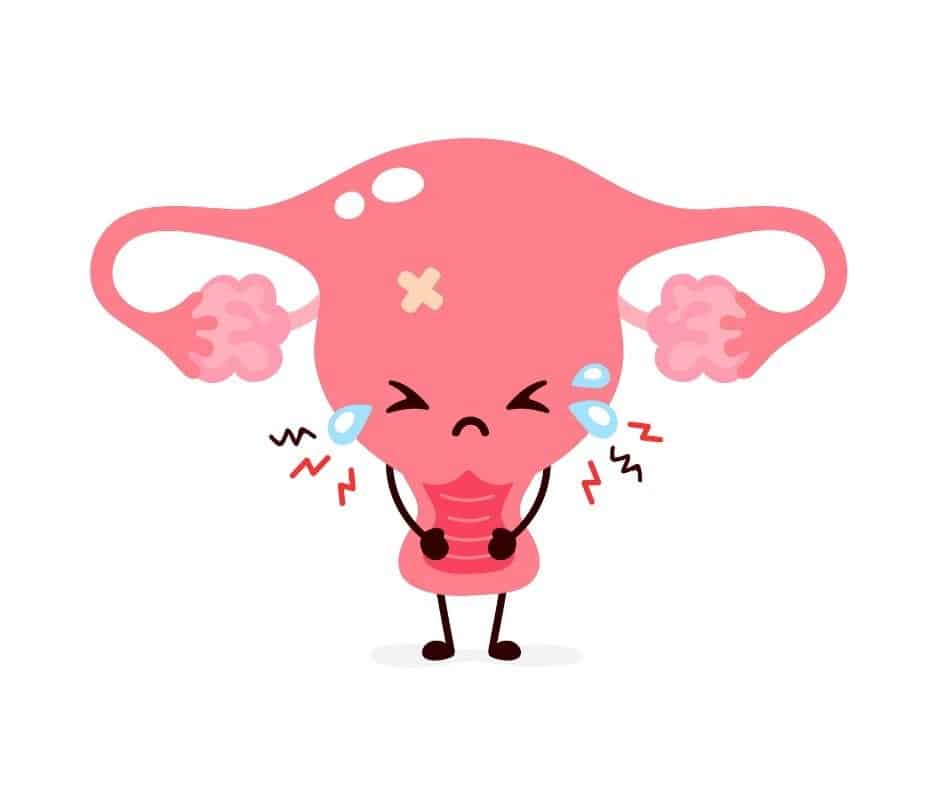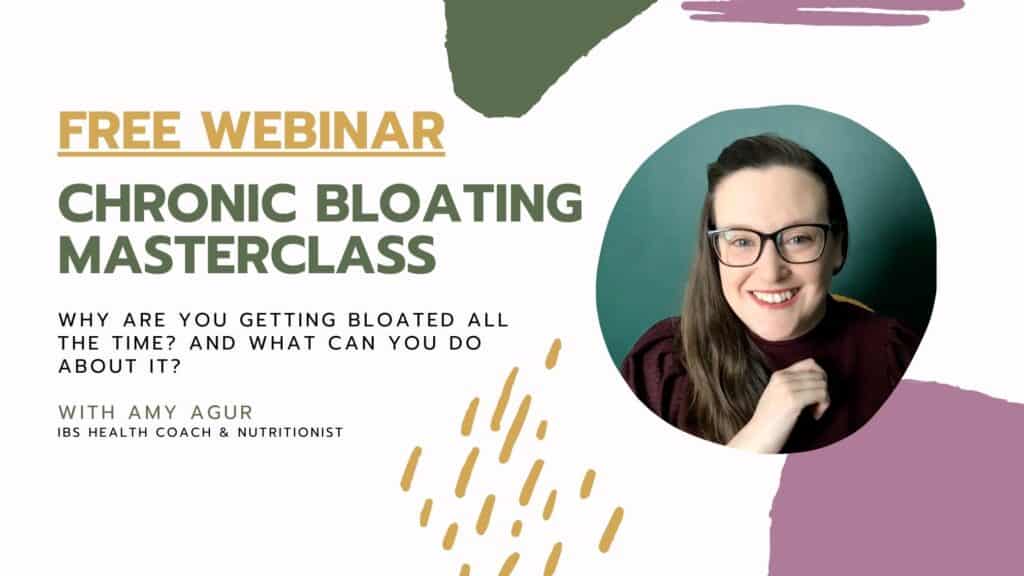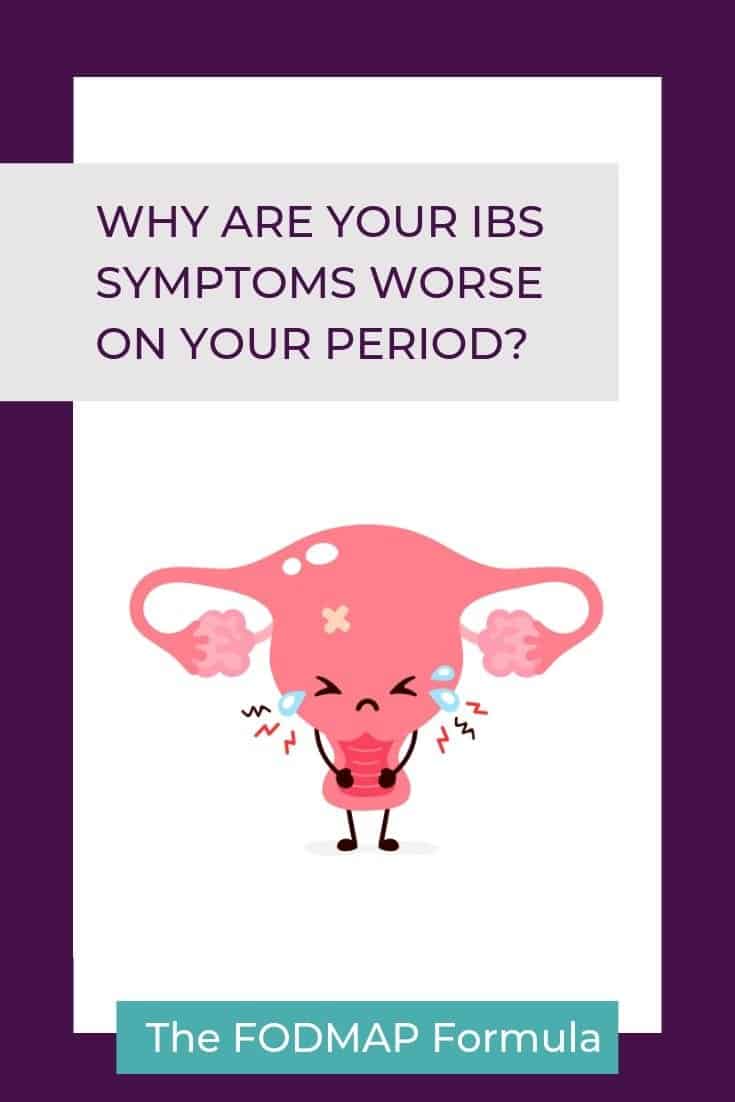Have you ever wondered why your IBS symptoms flare during your period? In this article, we’ll talk about what physically happens during your ovulation cycle and how natural fluctuations in your body may impact your IBS symptoms. Ready to get down and dirty with your insides? Let’s go!

Understanding Your Menstrual Cycle
To understand why your IBS symptoms may be worse during your period, let’s take a moment to talk about what’s happening during each phase of your ovulation cycle.
First of all, your ovulation cycle is controlled by a group of hormones created by the pituitary gland, the hypothalamus, and the ovaries. While everyone is a little different, the ovulation cycle is generally around 21 – 35 days and happens in three phases.
- Phase One – The Follicular Phase: Happens from day 1 – 14 of your cycle. While you’re menstruating, your body will prepare a new egg for fertilization.
- Phase Two – The Ovulatory Phase: Happens around day 14 of your cycle. A mature egg is released and travels to the fallopian tube.
- Phase Three – The Luteal Phase: Happens from around day 14 to the end of your cycle. Depending on whether the egg has been fertilized, the body will either release chemicals to help the egg attach to the uterine wall or help shed the uterine lining.
The Follicular Phase
The first phase of the ovulation cycle is called the “follicular phase.” This phase starts on the first day of your period and lasts from day 1 –14 of your cycle. The “average” period usually lasts somewhere between 3 – 8 days. Once your period is over, your body will begin to rebuild the uterine lining.
While your uterus is busy doing that, your pituitary gland releases a hormone called follicle stimulating hormone or FSH. This hormone tells the ovaries to produce several follicles, each of which contains one egg.
Over the next few days, one follicle will become dominant, and the others will shrink back into the ovary. The final follicle will continue to develop a mature egg.
Around day 12 of your cycle, the follicle will release a burst of estrogen that travels through the bloodstream to the pituitary gland. Your pituitary gland then releases luteinizing hormone or LH to help the follicle increase in size.
The Ovulatory Phase
The second phase of your cycle is called the “ovulatory phase,” and starts around day 14 of your cycle. During this phase, a sudden surge in the hormones FSH and LH will cause the follicle to burst and eject the egg and any surrounding fluid into the abdomen.
Tiny fingers at the end of the fallopian tube called fimbriae, catch the egg and shuttle it gently inside. Once the egg enters the fallopian tube, it’s carried toward the uterus by gentle muscle contractions.
The egg is typically fertilized while it travels through the fallopian tube. If the egg is fertilized when it reaches the uterus, it will attach itself to the uterine wall. If not, the egg will break down and exit the body during menstruation.

The Luteal Phase
Once the egg has been released, the follicle seals over. This is called the corpus luteum, and it’s the start of the third and final phase of your cycle, called the “luteal phase.”
During this phase, levels of FSH and LH drop suddenly, and the corpus luteum starts to produce progesterone to help keep the uterine lining in place. This allows more time for a fertilized egg to attach securely to the uterine lining.
If the egg isn’t fertilized, the corpus luteum will disintegrate, and progesterone levels will drop. This change in hormones signals the body to menstruate.
When the cells of the uterine lining start to break down, they release chemicals called prostaglandins. These chemicals tell the muscles of the uterus to contract, which helps move tissue and blood out of the body.
Why IBS Symptoms Flare During Your Period
A few things happen during the ovulation cycle that can muck up your IBS. First of all, progesterone is a muscle relaxant. Since your body uses muscle contractions called peristalsis to move poop through your gut, the relaxing effect of progesterone can make it much harder to go to the bathroom. So you might feel constipated right after ovulation when levels of progesterone are at the highest.
Once the corpus luteum disintegrates, your progesterone levels will drop. This can “open the flood gates” so to speak, and you may get very sudden relief from your constipation (some people call these “period poos”).
While your progesterone levels are dropping off, the cells in the uterine lining start to release prostaglandins. Apparently, prostaglandins like to travel, because they can end up in your intestines, your stomach, or your brain.
No matter where they land, these little chemicals scream contract at the top of their tiny little lungs, which can lead to symptoms like diarrhea, nausea, and migraines.
Since researchers have begun to acknowledge that the majority of people with IBS are from the XX crew, studies are beginning to investigate how the reproductive cycle impacts IBS symptoms.
While this research is still in the early phases, studies have shown that many people with IBS react to the sudden drop in estrogen and progesterone, specifically. This can increase constipation, diarrhea, and bloating, or your usual symptoms may be more intense than usual.
Research has also shown that people who experience painful periods (called dysmenorrhea) are twice as likely to experience an increase in symptoms.
Final Thoughts
As if having your period wasn’t already the worst, research is showing that natural fluctuations in levels of estrogen and progesterone during the ovulation cycle can increase symptoms of constipation, diarrhea, and bloating in people with IBS.
I hope this post has shed some light on why your symptoms seem to get worse on your period. If you like this article, don’t forget to share it! Together we’ll get the low FODMAP diet down to a science!
You might also like one of these articles:
10 Questions You Should Ask Your Doctor Not sure what to ask at your next doctor’s appointment? Start with these 10 simple questions! * Grab my printable cheat sheet!
IBS and Exercise Think having IBS means you can’t exercise? Think again, friend! Here’s what you need to know about incorporating physical activities into your life.
How to Relieve Trapped Gas Need some help letting it go? These practical tips will help you prevent trapped gas when you can and relieve it when it strikes.
If you like this post, don’t forget to share it! Together we’ll get the low FODMAP diet down to a science!

